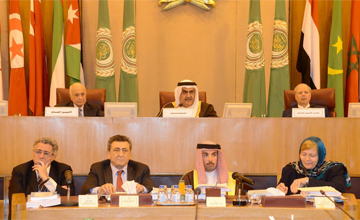ID :
399902
Fri, 03/11/2016 - 02:10
Auther :
Shortlink :
https://www.oananews.org//node/399902
The shortlink copeid
Bahrain takes over Arab League council presidency

Cairo, Mar. 10 (BNA): The Minister of Foreign Affairs, Shaikh Khalid bin Ahmed bin Mohammed Al Khalifa, took over the presidency of the Arab League Ministerial Council, in its 145th regular session, right at its opening in Cairo, Arab Republic of Egypt.
In a statement, the Minister appreciated the great effort exerted by the brotherly United Arab Emirates during its presidency, hailing the distinguished role it played in achieving new mechanisms and important decisions and stances which, he said, had a great positive impact on pan-Arab action.
He also commended the efforts of the Arab League Secretary General Nabil Elaraby and the efforts of all the employees of the Secretariat General for the sound organization, follow-up and arrangements for the activities of the current session.
He affirmed that the phenomenon of terrorism and the spread of terrorist groups are at the top of the challenges facing the Arab countries as terrorist are found on the Arab territories, from where they operate to play havoc and sow danger and crimes, helped by some countries that provide shelter to those who are at large to help them escape from justice, opening military training camps and smuggling weapons and explosives for them, securing financial and media back-up in addition to other practices that conflict with the principles of good neighborliness, international laws and norms.
Shaikh Khalid bin Ahmed bin Mohammed Al Khalifa outlined in his speech the most important developments and issues on the Arab arena, noting that the Palestinian cause has become more complicated than ever because of the escalated occupation and settlement, the tightened siege and the repetitive attacks on the Palestinian people and their religious sanctities.
He called on the international community, particularly the Security Council to assume their legal and moral responsibilities in achieving just and comprehensive peace, according to the Arab peace initiative and international legitimacy resolutions.
The Minister reiterates the unflinching position of the Kingdom of Bahrain that rejects Iran’s ongoing occupation of the three UAE Greater Tunb, Lesser Tunb and Abu Musa islands, affirming UAE’s unquestionable sovereignty over them.
He condemned in the strongest terms Iran’s continued meddling in the domestic affairs of the Arab States, the support it offers to the terrorists, the smuggling of weapons and explosives for the terrorist and training them on their use as well as its continued hostile statements at all levels.
He affirmed that Iran does not accord any importance to the principle of good neighborliness, religious or geographic bonds nor does it accord any importance to UN principles, international laws or norms, giving living examples of its abhorred conduct when it created terrorist groups in the Kingdom of Bahrain, that are paid for and trained by the Iranian Revolutionary Guards and the terrorist Hezbollah, and attacked the Saudi missions in Tehran and Mashhad.
He called on Iran to immediately cease such practices that aim to encroach on the sovereignty and independence of the Arab states and urged it to change of conduct and policies in a way that would preserve regional stability and security.
Regarding the situation in Syria, the Minister explained that the best solution is to adopt an inclusive comprehensive political process on the basis of the first Geneva conference’s statement in 2012, allowing the flow of humanitarian aid to the Syrian people at home and in neighboring countries that host the refugees, activating UN Security Council resolution 2165 and resolution 2254.
He also called on major countries to adopt mutual cooperation and understanding in resolving the Syrian crisis while concerning Yemen; he stressed the continuation of the efforts of the Saudi- led Arab coalition until the legitimate government become able to extend its state influence on all parts of the country.
He vowed, at the same time, commitment to providing various types of humanitarian assistance and asserted the need for a political solution, based on the Gulf initiative and its mechanisms of implementation and the outputs of the Yemeni national comprehensive dialogue and the Riyadh conference in addition to the unconditional implementation of UN Security Council resolution 2216.
Furthermore, the Minister of Foreign Affairs has welcomed the efforts aiming to strengthen the national partnership in Iraq to be able to overcome all the challenges and get rid of terrorist groups operating on the Iraqi territory such as Daesh, Hezbollah and other armed militias, and put an end to foreign intervention and restore security and stability in the country.
On the other hand, Shaikh Khalid bin Ahmed bin Mohammed Al Khalifa expressed hope that the Libyan parties would agree about the formation of a mini National reconciliation government, to be a step forward on the path of ending the Libyan crisis and achieving the aspirations of the brotherly Libyan people for safety, security, stability, development and well-being.
He also pointed out to the need to accord more attention to the economic challenges facing the Arab countries and to address them through development of the economic summit mechanisms and others, amid the sweeping financial crisis in more than an Arab county, which was aggravated by the collapse of oil prices to an unprecedented low, impacting negatively the sustainability of economic and social development that is being sought by all.
" the difficulties and problems facing the Arab countries and the ordeals and crises they are going through should not cripple them with despair or frustration or drag them to divide or failure, rather than they should prompt them to make more serious efforts to maintain unity among the countries and peoples, " he added.
He said they should increase self-confidence and conviction that with the substantial capacities and immense potentials that the Arab states possess, they will be able to surmount any attempt to weaken their position and their quest for stability and development towards a shining phase, characterized by peace, prosperity and affluence.





